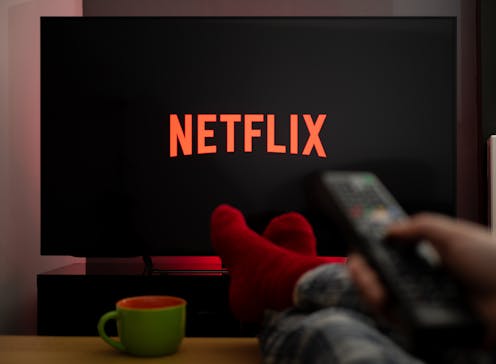Netflix is snapping at the heels of the BBC. But there’s more to the battle than just viewing figures
- Written by Jean Chalaby, Professor of Sociology, City St George's, University of London

During the last quarter of 2024, Netflix pulled a larger audience in the UK than BBC One, becoming the country’s most popular TV service[1]. Across its entire portfolio, the BBC remains the nation’s favourite news and entertainment destination, but this is nonetheless a significant milestone for a US-based streamer. After all, Netflix[2] was a service that sent DVDs[3] through the post in California a couple of decades ago.
I have researched TV in the streaming era[4] and the issue for national broadcasters is that streaming is a global industry. That is to say, content produced locally benefits operations globally – subscribers in country A benefit from content produced primarily for viewers in country B. As such, there are mutual gains from subscriber growth in either territory, since that provides an incentive for a platform to increase content in either location.
And as Netflix grows, so too does its value to viewers. This model constitutes a considerable competitive advantage[5] for it and other platforms that stream content across borders.
Without Hollywood films and TV series, Netflix would be a fringe player in the US market, but this content also appeals to subscribers around the world. The same applies to Korean programmes, which serve a demanding local audience and have also proved popular worldwide. In mid-January, Netflix’s most viewed shows[6] in the UK were a mix of US and Korean programmes, including the second season of Squid Game.
Read more: Squid Game's second season is the latest instalment of Korean culture's economic success story – so what's the secret?[7]
Netflix is savvy at making content circulate across continents, using its huge library to its advantage. Its scale gives it an unassailable edge over local rivals.
This strategy is centred on content portability and was explained by Netflix CEO Ted Sarandos[8], who said: “We’re not trying to make more Hollywood content for the world, we’re trying to make content from anywhere in the world to the rest of the world.”
In fact, Netflix has both Hollywood and non English-language content. But in any event, the platform never competes on a level playing field with local services and whenever it enters a market it does so with the benefit of a library built for other territories.
Netflix and the other streaming giants are reshaping media systems across Europe. An audience survey[9] in four European countries (Denmark, Germany, Italy and the Netherlands) of 1,813 respondents aged between 16 and 34 revealed that Netflix was by far the most popular destination[10] for long-form content such as films. The survey also confirmed that Netflix, alongside Amazon Prime Video and Disney+, were the most watched streaming services in these four countries.
As a result of this renewed competition, Europe’s commercial broadcasters[11] are struggling for advertisers, viewers and investors. My calculations show that at the end of 2024, the collective market capitalisation of Europe’s largest commercial broadcasters in the region’s five biggest markets (France, Germany, Italy, Spain and the UK), plus the Nordic countries, was just 5.6% that of Netflix[12] (US$14.2 billion (£11.5 billion) versus US$252.5 billion[13]).
Navigating this global system is equally challenging for public service media like the BBC. They too are losing audiences, particularly young viewers, to streaming services. Historically, the EU and the UK have been good at protecting their film and TV production sectors.
An EU directive[14], for example, stipulates that streaming services must “secure at least a 30% share of European works in their catalogues” and ensure that content is prominently available. In the future, the EU and UK may have need to strengthen their support for public service media as well.
But Netflix is fond of European content anyway, and is investing billions[16] of dollars in the region. For the first time in 2024, the service was spending more[17] on international content than US programming (US$7.9 billion versus US$7.5 billion). And, in the UK alone, Netflix has invested more than US$6 billion[18] since 2020.
While on the face of it this investment is a coup for domestic creative industries, the issue is that it remains a US-based service that decides which stories are told, and how. Netflix is interested in indigenous content, but during the production process its commissioners shape these stories[19] with a transnational audience in mind.
As such, the local stories that Netflix selects in the UK and elsewhere are not necessarily those that a public service broadcaster would choose to tell. What’s more, the UK has no control over the ownership of these platforms and, depending on whose hands they fall into, this may prove an issue in the future.
Public service media, including the BBC, are instruments of national self-representation, which reflect a country’s idiosyncrasies, its mood and its strengths and weaknesses better than any other platform. It is an ability and a privilege the UK must retain.
References
- ^ most popular TV service (deadline.com)
- ^ Netflix (www.cambridge.org)
- ^ sent DVDs (www.silicon.co.uk)
- ^ TV in the streaming era (www.cambridge.org)
- ^ competitive advantage (academic.oup.com)
- ^ most viewed shows (www.netflix.com)
- ^ Squid Game's second season is the latest instalment of Korean culture's economic success story – so what's the secret? (theconversation.com)
- ^ Ted Sarandos (post45.org)
- ^ audience survey (www.kcl.ac.uk)
- ^ most popular destination (kclpure.kcl.ac.uk)
- ^ Europe’s commercial broadcasters (videoweek.com)
- ^ Netflix (academic.oup.com)
- ^ US$252.5 billion (companiesmarketcap.com)
- ^ EU directive (eur-lex.europa.eu)
- ^ Ludovic Robert/Netflix (media.netflix.com)
- ^ investing billions (www.hollywoodreporter.com)
- ^ spending more (www.ampereanalysis.com)
- ^ US$6 billion (www.theguardian.com)
- ^ shape these stories (ijoc.org)







